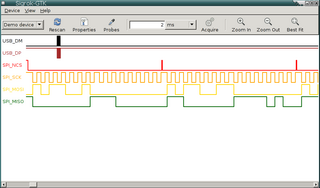Linux
This page describes how to build/install the sigrok subprojects on Linux.
Distribution packages
See Downloads.
Building
libserialport
Installing the requirements:
Example on Debian/Ubuntu (please check your respective distro's package manager tool if you use other distros):
$ sudo apt-get install git-core gcc make autoconf automake libtool
Building:
$ git clone git://sigrok.org/libserialport $ cd libserialport $ ./autogen.sh $ ./configure $ make $ sudo make install
libsigrok
Installing the requirements:
Example on Debian/Ubuntu (please check your respective distro's package manager tool if you use other distros):
$ sudo apt-get install git-core gcc g++ make autoconf autoconf-archive \ automake libtool pkg-config libglib2.0-dev libglibmm-2.4-dev libzip-dev \ libusb-1.0-0-dev libftdi-dev libudev-dev libasound2-dev check doxygen \ python-dev python-gi-dev python-setuptools swig default-jdk
Fedora (18, 19):
$ sudo yum install git gcc make autoconf automake libtool pkgconfig glib2-devel \ libzip-devel libusb1-devel libftdi-devel libudev-devel alsa-lib-devel check-devel
Fedora 20: As above, but replace libudev-devel with systemd-devel
OpenSuSE (12.2):
$ zypper install git gcc make autoconf automake libtool pkg-config glib2-devel \ libzip-devel libusb-1_0-devel libftdi1-devel libudev-devel alsa-devel check \ python3-devel
Building:
$ git clone git://sigrok.org/libsigrok $ cd libsigrok $ ./autogen.sh $ ./configure $ make $ sudo make install
libsigrokdecode
Installing the requirements:
Example on Debian/Ubuntu (please check your respective distro's package manager tool if you use other distros):
$ sudo apt-get install git-core gcc make autoconf automake libtool pkg-config libglib2.0-dev python3-dev
Fedora (18, 19, 20):
$ sudo yum install git gcc make autoconf automake libtool pkgconfig glib2-devel python3-devel check-devel
Building:
$ git clone git://sigrok.org/libsigrokdecode $ cd libsigrokdecode $ ./autogen.sh $ ./configure $ make $ sudo make install
sigrok-cli
Installing the requirements:
Example on Debian/Ubuntu (please check your respective distro's package manager tool if you use other distros):
$ sudo apt-get install git-core gcc make autoconf automake libtool pkg-config libglib2.0-dev
Fedora (18, 19):
$ sudo yum install git gcc make autoconf automake libtool pkgconfig glib2-devel
OpenSuse (13.1):
$ zypper install git gcc make autoconf automake libtool pkgconfig glib2-devel
Building:
$ git clone git://sigrok.org/sigrok-cli $ cd sigrok-cli $ ./autogen.sh $ ./configure $ make $ sudo make install
PulseView
Installing the requirements:
Example on Debian/Ubuntu (please check your respective distro's package manager tool if you use other distros):
$ sudo apt-get install git-core g++ make cmake libtool pkg-config \ libglib2.0-dev libqt4-dev libboost-dev libboost-test-dev libboost-thread-dev libboost-filesystem-dev libboost-system-dev
Fedora (18, 19):
$ sudo yum install git gcc cmake libtool pkgconfig glib2-devel \ boost-devel qt-devel boost-devel
Building:
$ git clone git://sigrok.org/pulseview $ cd pulseview $ cmake . $ make $ sudo make install
Common problems
If you get this error:
sigrok-cli: error while loading shared libraries: libsigrok.so.0: cannot open shared object file: No such file or directory
Then you have to rebuild the links to your shared libraries:
$ sudo ldconfig /usr/local/lib
